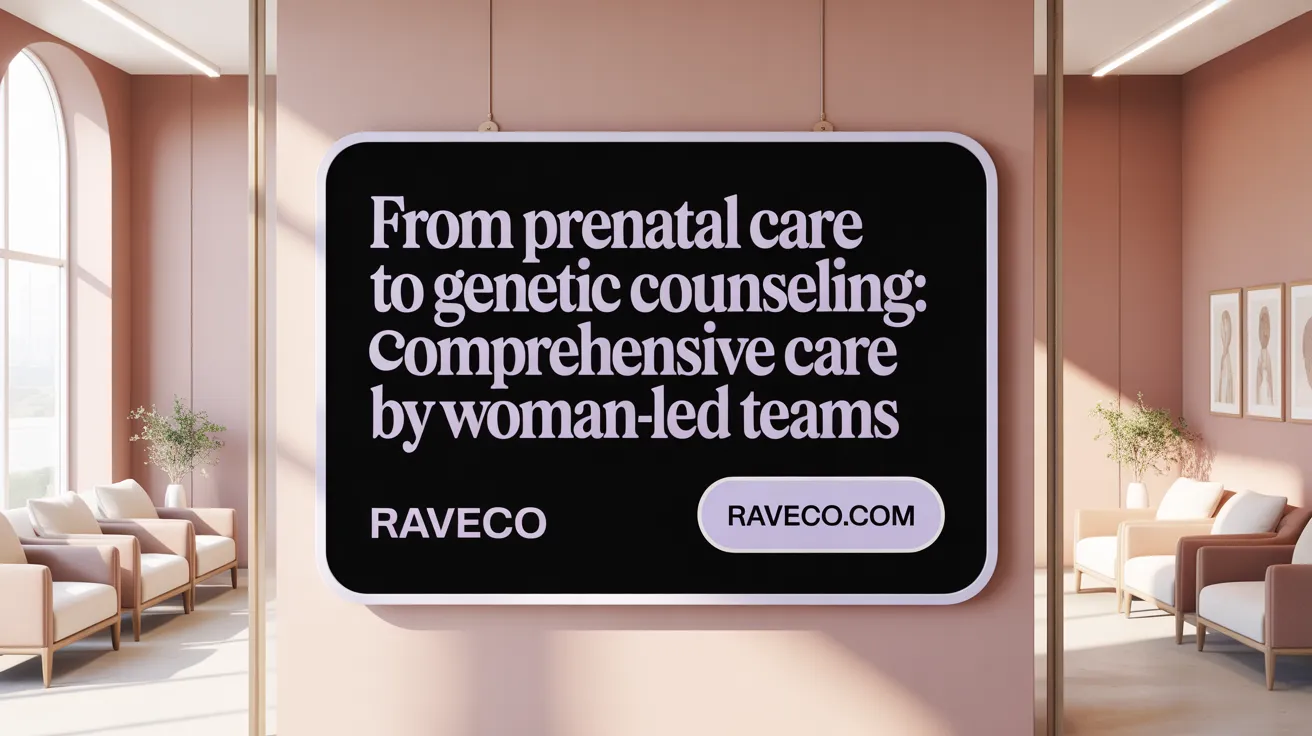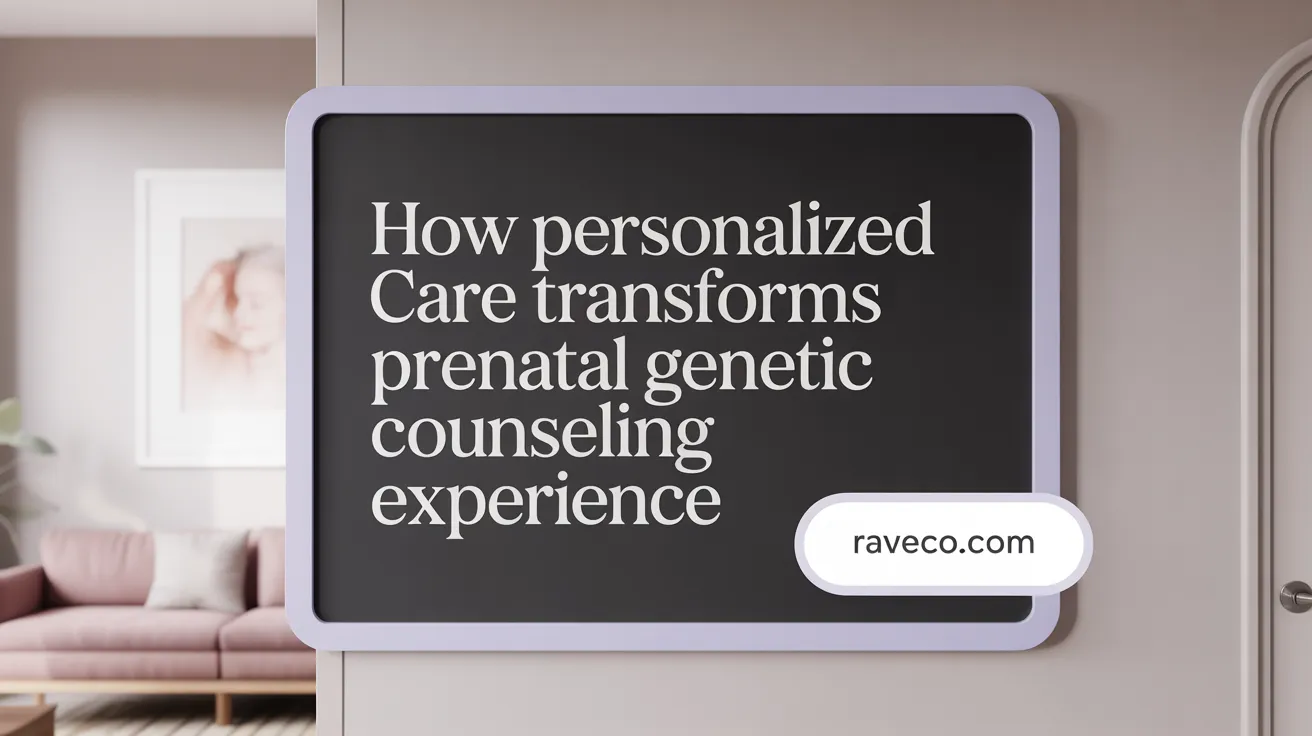Empowering Choices: The Essentials of Birth Control Counseling

Introduction to Prenatal Genetic Counseling and Its Importance
What is Prenatal Genetic Counseling?
Prenatal genetic counseling is a specialized service that helps expectant mothers understand their baby's genetic health. It involves assessing risk factors based on family, medical, and pregnancy history to identify the chance of genetic conditions.
How Are Risks Assessed?
Counselors review health and family backgrounds, including details from multiple generations, to evaluate potential genetic disorders. This process supports informed decision-making about pregnancy planning and prenatal testing.
Why is it Important, Especially in Queens, NY?
Prenatal genetic counseling is crucial for women with a family history of genetic diseases, advanced maternal age (35+), or abnormal prenatal screening results. Queens residents benefit from access to expert, woman-led obstetrics and gynecology providers who integrate genetic counseling into routine pregnancy care.
Services Offered by Women-Led OB-GYN Providers
These providers offer comprehensive services including preconception counseling, carrier screening, non-invasive prenatal testing, diagnostic procedures like amniocentesis, and continuous support. Their patient-centered approach ensures culturally sensitive care tailored to individual needs in diverse communities like Queens.
Comprehensive Services Offered by Woman-Led Obstetrics and Gynecology Providers

What services does a woman-led healthcare provider specializing in obstetrics and gynecology typically offer?
Woman-led healthcare providers specializing in obstetrics and gynecology deliver a broad spectrum of services customized to support women's health through all life stages. Their offerings begin with comprehensive prenatal care, including regular monitoring, ultrasounds, and childbirth support to ensure safe and healthy pregnancies.
In addition to prenatal care, these providers offer reproductive health services such as fertility evaluations, family planning, and contraception counseling designed to empower women in making informed choices about their reproductive lives. They also provide menopause management and routine gynecological exams aimed at maintaining overall reproductive wellness. You can learn more about these services at UCLA Health Women's Clinic.
A cornerstone of their care is the integration of personalized genetic counseling and testing. This includes risk assessment based on family and medical history, carrier screening, non-invasive prenatal testing, and diagnostic procedures like amniocentesis or chorionic villus sampling. These advanced services help anticipate and manage potential genetic conditions, providing women with clarity and support throughout their pregnancies. For specialized prenatal genetic counseling and risk evaluation in Queens, NY, see the Genetic Counseling Services offered by leading providers.
Emphasizing patient-centered and compassionate care, woman-led providers often focus on mental health support and minimally invasive gynecological surgeries, improving recovery times and patient comfort. This holistic, tailored approach ensures that women receive attentive, expert care that respects their individual values and needs, improving health outcomes for both mothers and babies in communities such as Queens, NY. Additional resources about comprehensive women's health and maternal mental health can be found at St. John’s Community Health Women's Clinic and UCI Health Women's Healthcare Center.
How Woman-Led Leadership Enhances Prenatal Genetic Counseling
How does being woman-led influence the approach to women's health care in obstetrics and gynecology?
Woman-led healthcare teams bring a profound impact on the quality of care in obstetrics and gynecology, including prenatal genetic counseling risk assessment. This leadership fosters empathy and recognizes the emotional and physical complexities unique to women, creating a supportive environment for sharing sensitive information.
Such teams naturally prioritize cultural sensitivity, respecting diverse backgrounds and personal values. This ensures counseling is personalized, acknowledging family history and genetic conditions critical in genetic risk assessment.
Patient-centered communication flourishes under woman-led care, emphasizing open dialogue, thorough genetic testing and counseling explanation of genetic risks and testing options, and emotional support throughout decision-making. This encourages informed and confident choices regarding prenatal genetic testing screening and diagnostic tests.
An education and prevention focus is also a hallmark, empowering women with knowledge about inheritance patterns, prenatal genetic counseling, and lifestyle factors affecting genetic outcomes. This proactive guidance helps in prenatal genetic counseling family planning advice and managing pregnancy risks effectively.
Thus, woman-led leadership strengthens prenatal genetic counseling by offering compassionate, culturally aware, and informative care tailored to women’s unique health journeys.
Advancements in Prenatal Genetic Testing and Screening Options

What advances in women's health care are commonly integrated by specialized obstetrics and gynecology providers?
Specialized obstetrics and gynecology providers incorporate modern advances to enhance care quality. These include minimally invasive gynecological surgeries that promote quicker recovery and less pain, use of high-resolution imaging, and comprehensive genetic testing for precise diagnosis and treatment tailoring. Mental health support and personalized wellness plans are also part of this holistic care.
What are the various prenatal genetic screening and diagnostic tests available?
Prenatal genetic testing includes screening and diagnostic options:
- Screening tests estimate the risk of genetic conditions without confirming them. For more details on screening tests for genetic conditions.
- Diagnostic tests provide definitive diagnosis but carry some risks. Read about diagnostic genetic tests and their risks.
What is Non-Invasive Prenatal Screening (NIPS)?
NIPS is a blood test performed from about 10 weeks of pregnancy. It analyzes fetal DNA fragments in the mother's blood to screen for chromosomal abnormalities such as Down syndrome, trisomy 18, and trisomy 13. It is safe, painless, and poses no risk to the fetus.
How do ultrasound and blood tests contribute to prenatal genetic screening?
Ultrasounds assess fetal development and can detect structural abnormalities. Blood tests such as the first trimester screen or quad screen analyze maternal hormone and protein levels to estimate risk for chromosomal disorders. These tests typically occur between 10 and 22 weeks of pregnancy, as explained in detail in prenatal genetic testing timelines and procedures.
What roles do chorionic villus sampling (CVS) and amniocentesis play?
These are invasive diagnostic procedures:
- CVS is done between 11 and 13 weeks and samples placental tissue. Learn more about Chorionic Villus Sampling (CVS).
- Amniocentesis is performed after 16 weeks and samples amniotic fluid. More on Amniocentesis Procedure.
Both tests confirm genetic conditions with high accuracy but carry a small risk of miscarriage.
Why is risk assessment and timing important?
Assessment of family history, maternal age (especially 35 and older), prior pregnancy issues, or abnormal screening results guides test selection. Timing is critical to ensure accurate results and proper decision-making, with early screening enabling more options. For guidance, see Prenatal Genetic Counseling and Risk Assessment.
These advancements allow families to access personalized, evidence-based prenatal care, supporting informed decisions and better pregnancy outcomes. For comprehensive services and genetic counseling support, see Genetic Counseling Services in Queens, NY.
Implementing Personalized Care in Prenatal Genetic Counseling

How is personalized care implemented in women's health services provided by specialists?
Personalized care in women's health is centered around creating individualized plans that account for a woman's unique family and medical history, lifestyle, cultural background, and personal preferences. Specialists in prenatal genetic counseling risk assessment, such as those working within institutions like Northwell Health genetic testing and counseling services and NewYork-Presbyterian in Queens, NY, integrate comprehensive risk assessment of family medical history and pregnancy factors to tailor counseling and testing options.
Development of individualized care plans
Prenatal genetic counselors develop customized care plans by first gathering detailed three-generation family histories and detailed pregnancy records. They evaluate risks related to genetic diseases, birth defects, and pregnancy complications. Based on this assessment, counselors discuss appropriate screening and diagnostic options like non-invasive prenatal screening (NIPS), chorionic villus sampling (CVS), and amniocentesis. Plans also consider patient values and goals, ensuring decision-making is collaborative and sensitive.
Assessment of family and medical histories
Collecting extensive family and medical information is a fundamental step. Counselors assess not only genetic risks but also other relevant factors such as advanced maternal age (35+), paternal age, ethnicity, or exposures during pregnancy. This thorough evaluation helps identify patients who would benefit most from testing and supports accurate interpretation of results. The process includes family, medical, and pregnancy history evaluation and genetic risk assessment.
Cultural and personal considerations in counseling
Effective genetic counseling respects cultural diversity and individual circumstances. Providers in Queens deliver culturally responsive care in Queens NY, addressing community-specific genetic risks related to ethnicity and offering support that considers personal beliefs and emotional needs. This ensures that counseling empowers patients while being sensitive to their backgrounds.
Insurance coverage and accessibility in Queens, NY
Most prenatal genetic counseling and testing services in Queens are covered by major insurance plans including Medicaid and Medicare. Clinics and hospitals ensure that patients have access to these services through insurance facilitation and, where necessary, sliding fee scales. This accessibility allows a broad spectrum of women in Queens to benefit from advanced prenatal genetic counseling, ensuring equitable care, as detailed by prenatal genetic counseling and insurance coverage resources.
This personalized approach in prenatal genetic counseling enhances informed decision-making, supports early detection of genetic conditions, and promotes healthier pregnancy outcomes.
Benefits and Considerations of Prenatal Genetic Counseling

Educational and Emotional Support
Prenatal genetic counseling offers comprehensive educational resources and emotional support for expectant parents. Counselors explain complex genetic information clearly, helping families understand the inheritance, causes, and implications of genetic disorders. This guidance reduces anxiety and empowers patients to make informed decisions.
Helpful for Families with Genetic Disease History
Families with a history of genetic diseases, birth defects, or pregnancy complications find genetic counseling particularly beneficial. The service evaluates family and medical histories, assessing individual risks to provide tailored information on potential genetic conditions that could affect the pregnancy.
Decision-Making Regarding Testing and Pregnancy Options
Genetic counselors assist patients in navigating prenatal testing options such as non-invasive prenatal screening (NIPS), chorionic villus sampling (CVS), and amniocentesis. They help interpret test results, discuss potential outcomes, and explore pregnancy management strategies including further diagnostic testing or considerations like pregnancy continuation or adoption (Prenatal genetic counseling - decision-making).
Early Risk Detection and Management
Counseling facilitates early risk assessment through evaluation of factors like advanced maternal age (35+), abnormal screening results, or ethnic background. Early identification of risks allows for timely planning and management of pregnancies, improving outcomes for both mother and fetus (Prenatal genetic counseling risk assessment).
Role in High-Risk Pregnancies
For high-risk pregnancies, including cases of recurrent miscarriages, infertility, or exposure to teratogens, prenatal genetic counseling plays a key role in comprehensive care. The counseling program often works alongside obstetricians, perinatologists, and genetic specialists to provide coordinated support and specialized prenatal diagnostic services.
Overall, prenatal genetic counseling combines education, emotional support, and expert guidance to help expectant parents confidently face genetic concerns and pregnancy decisions.
Conclusion: Empowering Families with Knowledge and Support
Prenatal genetic counseling plays a crucial role in empowering families by providing detailed information about genetic risks and available testing options. This knowledge enables parents to make informed decisions throughout pregnancy and plan for their child's health with greater confidence.
Accessible specialized care, including genetic counseling and advanced testing services offered by trusted centers in Queens, NY, and beyond, ensures that families receive personalized support tailored to their unique needs. Such comprehensive care is vital for addressing diverse genetic concerns and promoting healthy pregnancies.
Families are encouraged to explore genetic counseling options early, especially when risk factors like family history or advanced maternal age are present. Engaging with trained counselors fosters emotional support, clarity, and partnership in navigating complex reproductive choices.





.png)